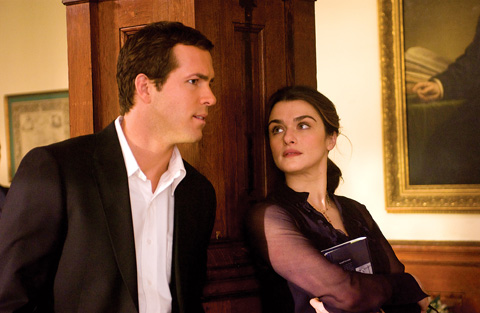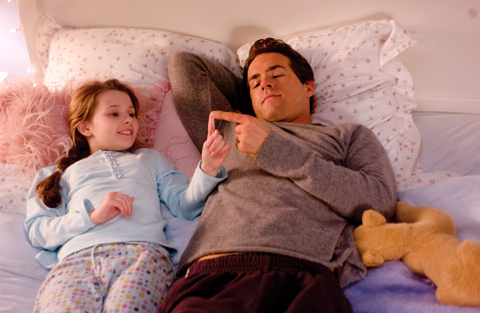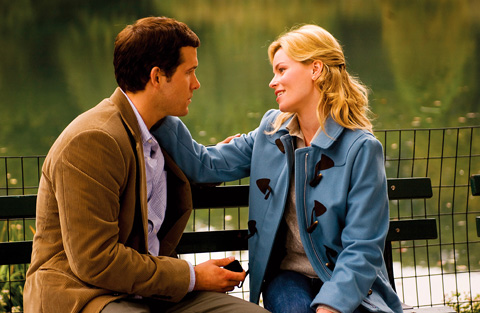Definitely, Maybe, a nimble and winning little romance written and directed by Adam Brooks, begins with one of those awkward Important Talks that parents are sometimes required to have with their children. In this case Maya Hayes (Abigail Breslin) needs some debriefing after a sex education class at her Manhattan elementary school. She’s acquired some technical vocabulary but not a lot of context, and so it falls to her dad, Will (Ryan Reynolds), to do the necessary explaining.
This is a delicate task since in the grown-up world of love, theory and practice frequently part company, which is what Will and Maya’s mother have recently done. Like any parent, Will wants to tell his daughter the truth without subjecting her to unnecessary disillusionment or cynicism. And Brooks faces a similar challenge, one that lesser romantic comedies tend to flee.
How do you preserve the fairy-tale elements of the genre — the beguiling fantasy of permanent bliss — in the face of certain prosaic and unavoidable facts? In the real world, after all, people divorce, sleep around, fall in love too soon, too late or too often.

PHOTOS COURTESY IF UIP
It’s a mess, and a movie like this one has to acknowledge the mess without falling into it, in which case it would be a sad little melodrama rather than a sparkling comic enchantment. In spite of everything, viewers, like Maya, have to walk away with our faith in soul mates and happy endings confirmed, rather than compromised or shattered.
So Will decides to tell Maya a slightly edited, PG-13 version of the story of his life and loves before she was born. At first the ending seems predictable enough: after various false starts and digressions, he will finally meet and marry her mommy. But neither the girl nor the audience knows which of the women his younger self meets the mother will turn out to be. (And for a while we forget that, after their happy ending, Mom and Dad will end up divorced.)
The candidates are neatly — but not too neatly — sorted by hair color and temperament. Emily (Elizabeth Banks), the obliging, blond college sweetheart; Summer (Rachel Weisz), the intriguing, slightly dangerous dark-haired intellectual; and April (Isla Fisher), the impetuous redhead with whom Will trades insults at the New York campaign headquarters of Bill Clinton.

PHOTOS COURTESY IF UIP
Ah, the 1990s. Among the many charms of Definitely, Maybe is the way it evokes the recent past without drowning in fussy period detail. Will, ambitious and idealistic, has come east from Madison, Wisconsin (leaving Emily behind), to plunge into the world of electoral politics; and while this movie is hardly an incisive political satire, it does capture some of the flavor of the times and, more generally, the headiness of youthful commitment to a cause.
Which is followed, perhaps inevitably, by disappointment. It is not hard to see that the Will of 1992 — smart, handsome, decent, happy in love, successful at work — is headed for a series of falls. Reynolds is dashing and sarcastic enough to fight off the lingering threat of blandness, and a subtle enough actor not to spoil his character’s unhappiness with self-pity. Will is, for all that, a bit of a cipher, or at least a sort of median Gen X-er, his edges smoothed away and his unruly appetites tamed.
Or maybe he’s just too modest and amiable to insist on being the most interesting person in his own story. Instead Reynolds is part of an attractive ensemble that includes Derek Luke, as Will’s best friend and sometime partner (they start a political consulting firm together after 1992), and Kevin Kline, as an aging gonzo journalist who is Will’s chief rival for Summer’s affection.

PHOTOS COURTESY IF UIP
But it is the women in Will’s life — including Breslin — who make up the affectionate, unsentimental heart of the film. Fisher in particular enlivens every scene she’s in with a comic energy that’s antic and graceful.
“Darlin’ you can’t love three,” says an old folk song, and in movies of this kind the man who does is likely to be viewed as a cad. Either that, or the women he doesn’t end up with will be shown to have such egregious flaws that their rejection will come as a relief.
Emily, Summer and April are all decidedly imperfect, but Brooks succeeds in showing how their shortcomings are, especially at first, part of their allure. He also makes clear that Will, besotted with each in turn, does not know any of them as well as he thinks he does. He also is not quite sure what he wants. The treachery of love — and also its promise — is that people can surprise you.

PHOTOS COURTESY IF UIP
And so can movies. I’ve been known to complain about the abysmal quality of contemporary American romantic comedies, which forsake intelligence, individuality and emotional risk for crude sex jokes or gauzy bridal-magazine fantasies. While Definitely, Maybe is hardly perfect, it navigates the choppy waters of modern courtship with commendable, understated honesty. Perhaps the best evidence of this is that this movie, unlike almost every other Hollywood tale of New York singles, was actually filmed in the city.

The Democratic Progressive Party (DPP), Chinese Nationalist Party (KMT), and the country’s other political groups dare not offend religious groups, says Chen Lih-ming (陳立民), founder of the Taiwan Anti-Religion Alliance (台灣反宗教者聯盟). “It’s the same in other democracies, of course, but because political struggles in Taiwan are extraordinarily fierce, you’ll see candidates visiting several temples each day ahead of elections. That adds impetus to religion here,” says the retired college lecturer. In Japan’s most recent election, the Liberal Democratic Party lost many votes because of its ties to the Unification Church (“the Moonies”). Chen contrasts the progress made by anti-religion movements in

Taiwan doesn’t have a lot of railways, but its network has plenty of history. The government-owned entity that last year became the Taiwan Railway Corp (TRC) has been operating trains since 1891. During the 1895-1945 period of Japanese rule, the colonial government made huge investments in rail infrastructure. The northern port city of Keelung was connected to Kaohsiung in the south. New lines appeared in Pingtung, Yilan and the Hualien-Taitung region. Railway enthusiasts exploring Taiwan will find plenty to amuse themselves. Taipei will soon gain its second rail-themed museum. Elsewhere there’s a number of endearing branch lines and rolling-stock collections, some

Last week the State Department made several small changes to its Web information on Taiwan. First, it removed a statement saying that the US “does not support Taiwan independence.” The current statement now reads: “We oppose any unilateral changes to the status quo from either side. We expect cross-strait differences to be resolved by peaceful means, free from coercion, in a manner acceptable to the people on both sides of the Strait.” In 2022 the administration of Joe Biden also removed that verbiage, but after a month of pressure from the People’s Republic of China (PRC), reinstated it. The American

Chinese Nationalist Party (KMT) legislative caucus convener Fu Kun-chi (傅?萁) and some in the deep blue camp seem determined to ensure many of the recall campaigns against their lawmakers succeed. Widely known as the “King of Hualien,” Fu also appears to have become the king of the KMT. In theory, Legislative Speaker Han Kuo-yu (韓國瑜) outranks him, but Han is supposed to be even-handed in negotiations between party caucuses — the Democratic Progressive Party (DPP) says he is not — and Fu has been outright ignoring Han. Party Chairman Eric Chu (朱立倫) isn’t taking the lead on anything while Fu